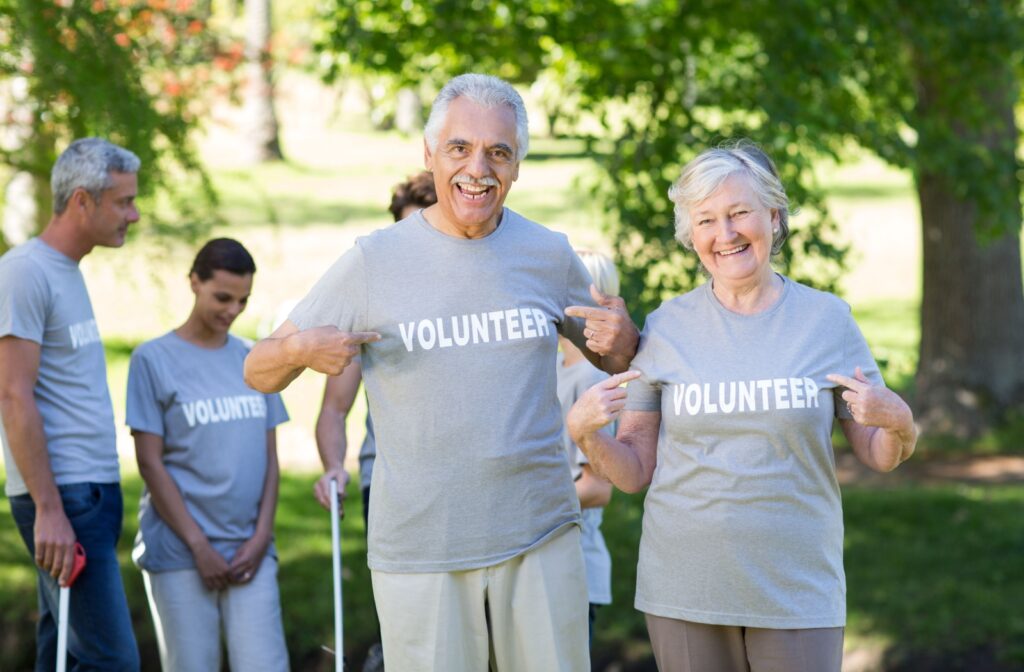It’s not uncommon to see loved ones who live by themselves or in assisted living spend less time with others and more time alone as they age or have poor health. Social isolation among older adults can affect their health and well-being.
Helping older adults avoid isolation and maintain social connections can include encouraging the following:
- Technology adoption
- Community engagement
- Volunteering
- Reaching out to caregivers and family
- Finding a new hobby
- Staying active
- Adopting a pet
- Transitioning to senior living
The Importance of Socialization for Seniors
Social isolation is the lack of social contact and interaction. Social interactions are fundamental to human well-being, irrespective of age.
Socialization plays a crucial role in enhancing the quality of life for older adults, offering companionship and significant mental and health benefits. For older adults, engaging in regular, meaningful social activities can help ward off feelings of loneliness and isolation, which are associated with higher risks of:
- High blood pressure
- Heart disease
- Obesity
- Weakened immune function
- Anxiety
- Depression
- Cognitive decline
Challenges in Maintaining Social Connections
Many older adults find it increasingly difficult to maintain social connections due to various factors, such as:
- Growing older
- Mobility issues
- Health challenges
- Hearing and vision problems
- Memory loss
- Loss of a spouse
- Friends moving away or passing on
Ways to Help Seniors Socialize & Avoid Isolation
There are many ways that family members and caregivers can help loved ones socialize and avoid isolation.
Technology Adoption
You can help combat social isolation in older adults with technology adoption. Introducing older adults to simple-to-use technology tools, such as smartphones, tablets, or computers, can open up new avenues for them to connect with family, friends, and interest-based communities online.
Video calls, social media platforms, and various apps designed for older adults can help them stay in touch with loved ones and meet new friends with similar interests. Older adults who aren’t tech-savvy can sign up for online or in-person classes to learn at their local libraries or community centers.
Community Engagement Programs
Local communities and organizations often host social activities and events designed specifically for older adults. These may include book clubs, fitness classes, art workshops, and more. Encouraging older adults to participate in these programs can significantly enhance their social network and provide regular occasions for interaction and engagement.
Volunteering
Volunteering is a great way to help older adults combat social isolation and stay connected. Many organizations offer volunteer opportunities for older adults, allowing them to meet new people, learn new skills, and give back to their community. Volunteering also provides a sense of purpose and fulfillment, benefitting older adults’ mental and emotional well-being.
Support from Caregivers & Family
Caregivers and family members play a pivotal role in addressing social isolation among loved ones. Simple acts of kindness, regular visits, phone calls, or arranging for transportation to community events can make a significant difference in their lives.
Find a New Hobby
Finding a new hobby can be an effective way for older adults to stay socially active and connected. Hobbies allow them to learn something new, engage in activities they enjoy, meet like-minded individuals, and potentially join interest-based groups or clubs. It also provides a sense of belonging and opens up opportunities for socializing and building new relationships.
Stay Active
Physical activity is essential for older adults to support their overall health and help maintain social connections. Joining group fitness classes or walking groups can be great opportunities to meet new people and stay connected.
Adopt a Pet
Pets provide companionship and unconditional love, making them excellent companions for older adults who may live alone. Caring for a pet brings a sense of purpose and responsibility, promoting mental and emotional well-being.
Additionally, taking pets on walks or to the park can create opportunities for social interactions with other pet owners, helping older adults stay connected to their community. However, before adopting a pet, it is important for older adults to carefully consider whether they have the ability and resources to properly care for it.
Senior Living Communities
Senior living communities provide a supportive and social environment for older adults, offering services and activities to help combat isolation, such as communal dining areas and planned social events. Living in these communities means older adults can make new friends, engage in meaningful activities, and maintain an active social life.
Helping Seniors Stay Connected
The fight against social isolation among older adults is a collective effort that requires the involvement of caregivers, family members, and communities. By fostering an environment that values socialization, we can contribute to a society where loved ones feel valued, connected, and happy.
If you’re looking for a community where a loved one can live an active, social, and engaging life, book a tour with The Legacy at Long Meadow to learn more about senior living.


